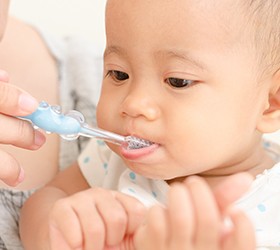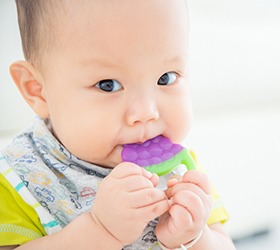Dentistry for Infants Birmingham, AL
Taking Care of the Littlest Smiles

No matter if you are a first-time parent attempting to navigate new territory when it comes to keeping your child’s oral health in check or not, knowing how to care for your baby’s smile can be a challenge. While many people believe regular dental checkups are not necessary until a child is old enough to brush and floss their teeth, Dr. Rohner and her team want to see your little one either by their first birthday or as soon as that first tooth erupts. Why? Because problems can develop at an early age. By addressing and potentially curbing these issues before they escalate, you can set your child up for optimal oral health as they grow and develop. If you’re looking for a dentist for babies and want to know more about what we can offer your little one, contact us today to schedule an appointment.
Age One Dental Visit

Once your child’s first tooth erupts or before they reach the age of one, it is recommended that you schedule their first dental appointment. This initial visit to the dentist’s office will create a positive relationship and experience for your little one. Not only will this set them up on the right track for better oral health, but they will establish healthy relationships with our dental team who will monitor their oral growth and development from infancy to adolescence.
Oral Health Risk Assessment

Along with the American Dental Association, Dr. Angelica Rohner and her team recommend bringing your child in for their first visit by their first birthday. To maintain good oral health, your child should see us every six months thereafter. Regular visits are vital to check for cavities and possible developmental problems. But before you begin these regular appointments, an oral health risk assessment is beneficial to allow our team to examine your child’s smile and determine whether there is a risk for tooth decay or developmental issues as well as provide you, the parent, with additional information that will help you care for your child’s teeth and gums at home.
Teething

Your child’s teeth actually start forming before birth. As early as 4 months of age, the primary teeth will begin to push through the gums. The lower central incisors are first, followed by the upper central incisors. The remaining 20 primary teeth typically erupt by age 3, but the place and order can vary from child to child.
Normally, the first tooth erupts between 6 and 12 months of age. Because of this, your child’s gums can become sore, tender, and irritable up until age 3. Rubbing sore gums gently with a clean finger, the back of a cold spoon, or a cold wet cloth can help ease this process. Teething rings work well too but avoid teething biscuits that contain cavity-causing sugars.
While your baby is teething, it is also important to monitor their teeth for signs of baby bottle decay. Examine their teeth and sides of the tongue, every two weeks to check for dull spots (whiter than the tooth surface) or lines. A bottle containing anything other than water that’s left in an infant’s mouth while sleeping can cause decay. The sugar in baby milk mixes with bacteria in dental plaque, forming acids that attack and deteriorate the tooth enamel. Each time a child drinks a liquid containing sugar, acids can attack their teeth for the next 20 minutes. When awake, saliva carries away the liquid. But during sleep, the saliva flow decreases, and liquids can pool around your child’s teeth for long periods and cause decay.
Fluoride Treatments

An available preventive service Dr. Rohner offers is fluoride treatments. This natural mineral is found in various toothpaste brands and even in regular drinking water. Designed to build strong tooth enamel and protect against decay, children often need additional treatment to minimize the possibility of cavity formation. By allowing your child’s pediatric dentist to administer this simple and easy treatment during a regular checkup and cleaning, you can better protect their smile from future decay and boost their oral health, too!
Non-Nutritive Habits

It is not uncommon for babies to suck their thumb or use a pacifier. While these habits are fine for a short while, overuse can lead to dental and orthodontic problems in the future. From a misaligned jaw or teeth to problems with their speech, Dr. Rohner can help you encourage your little one to establish newer, healthier habits that will not negatively impact their smile as they grow. We understand the process can be difficult but with the right tips and techniques and positive reinforcement, your child will not only be free of these “comfort” items but will have a healthy smile to enjoy moving forward.

